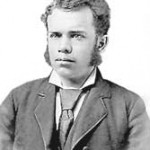A while back I wrote a post on “E. J. Waggoner as a Practical Theologian.” In it I quoted Waggoner who stated that “Every doctrine of the Bible is for our practical benefit, and should be studied for that purpose.”
Practical and Doctrinal Opposites?
 This is a very interesting thought for much of our preaching and thinking. Often we think of “practical” and “doctrinal” as being on two sides with a chasm in between. We cannot go over the chasm. So sometimes we preach “practical” sermons, and sometimes we preach “doctrinal” sermons.
This is a very interesting thought for much of our preaching and thinking. Often we think of “practical” and “doctrinal” as being on two sides with a chasm in between. We cannot go over the chasm. So sometimes we preach “practical” sermons, and sometimes we preach “doctrinal” sermons.
Members long for “practical” preaching that will help us live faithfully in our daily lives. However, there is also a call for us to know “doctrine.” We are to gain a deeper awareness and understanding of the truths that hold us up.
We Cannot Forget Doctrine
We cannot forget doctrine. When we do we lose something of who we are. The deity of Christ is a doctrine that is hotly debated in some circles today. However, the doctrine is an important one in our Christian heritage. The doctrine of the Sabbath also has a call on us as Seventh day Sabbatarians.
And for this reason, sometimes we teach and preach doctrines, while other times we teach and preach themes of practical living. E. J. Waggoner comes in and asks us why do we have this dichotomy? Why not preach doctrine by emphasizing its practical relevance? Why not preach doctrine by emphasizing its importance in our daily living? Why not preach and teach doctrine in such a way that we will immediately see its practical relevance just as we see the practical relevance of the traditional “practical” sermons?
Lowry’s Question
In short, we ask the same question that Eugene Lowry, the homilitician, wrote in his classic preaching text The Homiletical Plot. Lowry asks of any doctrine before he preaches it, “What bind does the doctrine get you out of?” In short, how does this doctrine help me overcome a problem?
Certainly there are times for more didactic teaching, but all of our doctrinal preaching need not be in lecture form. If we truly are to teach the Sabbath more fully, then we must find a way to live out the implications of the Sabbath in our daily lives. To do that, we must listen to both Lowry and Waggoner by asking about the practical benefit of the Sabbath. Then we will be in a position to be the witness to the Sabbath that God has called our movement to be.
 When Sabbatarians speak about the Sabbath, they often defend the correct day. Sometimes they speak about the correct way to keep the Sabbath, but we often neglect the Spiritual power that comes to the Christian.
When Sabbatarians speak about the Sabbath, they often defend the correct day. Sometimes they speak about the correct way to keep the Sabbath, but we often neglect the Spiritual power that comes to the Christian. 




